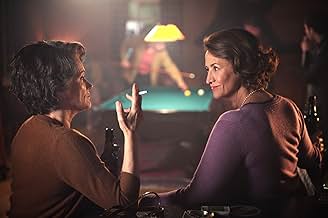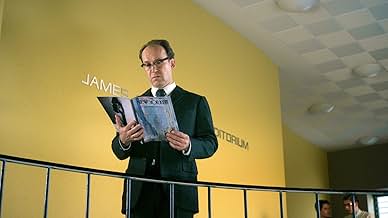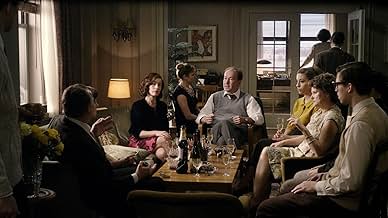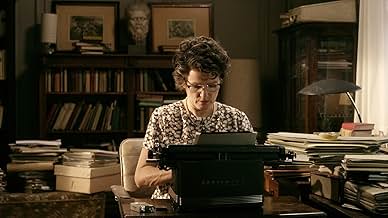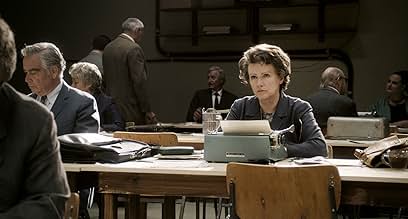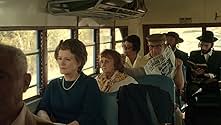Uno sguardo alla vita della filosofa e teorica politica Hannah Arendt, che ha denunciato il giornale "The New Yorker" per il processo per crimini di guerra contro il nazista Adolf Eichmann.Uno sguardo alla vita della filosofa e teorica politica Hannah Arendt, che ha denunciato il giornale "The New Yorker" per il processo per crimini di guerra contro il nazista Adolf Eichmann.Uno sguardo alla vita della filosofa e teorica politica Hannah Arendt, che ha denunciato il giornale "The New Yorker" per il processo per crimini di guerra contro il nazista Adolf Eichmann.
- Premi
- 8 vittorie e 18 candidature totali
- Student Laureen
- (as Leila Schaus)
Trama
Lo sapevi?
- QuizFor a deeper understanding of this story, one might care to watch Operation Finale (2018), which depicts the undercover mission to find and extract Adolf Eichmann from Argentina and bring him to trial in Israel. Showing the background of an operation sanctioned by PM David Ben-Gurion, the film gives a glimpse of the complexity of Eichman's character, his futile attempts to justify his actions and tell his side of the story.
- BlooperWhen Arendt stands on the terrace of her hotel in Jerusalem at looks across the Valley of Hinnom at the Old City, there are Israel flags flying from the Tower of David complex. However, the Old City of Jerusalem was still under Jordanian control in 1961.
- Citazioni
Hannah Arendt: You describe a book I never wrote.
Siegfried Moses: A book that will never be allowed in Israel. And won't appear anywhere else either if you have any decency left.
Hannah Arendt: You ban books, and lecture me about decency!
- ConnessioniFeatured in Kino Kino: Hannah Arendt (2013)
Few movies based on historical figures manage to combine a good sense of character with a first-rate story. Hannah Arendt is an exception. It is directed by Margarethe von Trotta, who had focused on such diverse (and strong) women of history as the nun and mystic Hildegard von Bingen and the leftist revolutionary Rosa Luxemburg. Her latest film is the story of one key episode in the life of Hannah Arendt, the German-American philosopher and political theorist. But Hannah Arendt transcends the bounds of "feminist" filmmaking. It is a work that puts before the viewer key questions about the nature of evil, about acceptance of authority, and about personal responsibility. At the same time it is a fine piece of storytelling.
Arendt was a German Jew who had studied under the noted philosopher Martin Heidegger, and who had a romantic relationship with him that soured when the Nazis came to power and Heidegger publicly supported them. She soon left Germany for France but in 1940 was imprisoned by the Vichy regime in the detention camp in Gurs. Escaping after a few weeks imprisonment, she fled with her husband to the U.S. Throughout and after the war she was active in Jewish causes, including the Zionist movement. In the 1950s she began a career of writing and teaching, which included appointments at such universities as Princeton, Yale and the University of Chicago. She became noted for two popular books, The Origins of Totalitarianism and The Human Condition.
The film deals with one short period in her life, Arendt's reporting on the 1961 Adolf Eichmann trial in Jerusalem for the New Yorker magazine, coverage she later turned into a book. In here account she spoke of "the banality of evil," evil done without thinking, because people were "following orders." Arendt's suggestion was that Eichmann was evil not so much because he was a monster, but because he was a mindless bureaucrat. Although she did not disagree with the guilty verdict or Eichmann's hanging, she was critical of the conduct of the trial. Even more controversial was her submission that some Jewish leaders contributed to the magnitude of the Holocaust by their complicity with the authorities. While she recognized the futility of open rebellion, she suggested that less cooperation would at least have saved more lives. Such suggestions, especially coming from a prominent Jew, provoked a firestorm of criticism, and threatened both Arendt's career and lifelong friendships. The movie becomes not just about a single life, but about freedom of expression - the sometimes harsh clash between ideas and fixed opinions - and the great personal costs this can involve.
Still, a movie that focuses so much on one individual requires a superb piece of acting. Director von Trotta gets this from Barbara Sukowa, who played both Hildegard and Rosa Luxemburg in her earlier films. Sukowa brings to the screen not only a supremely intelligent woman, but a very principled and determined one. At the same time she portrays a woman who can be tender and compassionate, and understanding even of her detractors. To blend such widely divergent qualities is no easy task, but Sukowa succeeds in anchoring them securely in the character she plays. Axel Milberg as Heinrich Blücher, Arendt's husband, more reserved, but supportive and protective, is equally credible. Another solid performance comes from Janet McTeer as the political activist, author, and Hannah's steadfast friend, Mary McCarthy. Included also among her inner circle was her secretary, Lotte, played very sympathetically and competently by Julia Jentsch. Two longtime Jewish friends, one in New York, Hans Jonas, and another in Jerusalem (also her former teacher), Kurt Blumenfeld, are very well represented by Ulrich Noethen and Michael Degen. And a very unrepentant and unapologetic Martin Heidegger is played by Klaus Pohl.
In addition to good acting a film that deals with the realm of ideas also requires a finely tuned screenplay and talented direction so that it does not just show pictures of "talking heads." Director von Trotta cooperated with Pam Katz on the script, and what they produced is obviously a labor of love. The situation of ideas against the background of such horrific concrete acts as genocide, and in particular against the showpiece trial of Eichmann, brings them into contact with the very real world. That reality is heightened by the decision not to dramatize Eichmann himself, but to show the genuine article as he appears in the TV footage of the trial. There is such genuine horror there, and yet such obvious banality, as to give Arendt's musings real weight.
In the end the film obliges the viewer to confront the questions Arendt is trying to raise. Are the roots of evil obvious or can they be far more subtle? Where does responsibility begin, and who in a society must take responsibility for the acts of the whole body? The film does not preach, but it certainly raises vital questions. A real gem! Hannah Arendt premiered at the Toronto International Film Festival on September 11, 2012. The movie will go into general release on January 17, 2013.
I più visti
- How long is Hannah Arendt?Powered by Alexa
Dettagli
- Data di uscita
- Paesi di origine
- Sito ufficiale
- Lingue
- Celebre anche come
- 漢娜鄂蘭:真理無懼
- Luoghi delle riprese
- Aziende produttrici
- Vedi altri crediti dell’azienda su IMDbPro
Botteghino
- Lordo Stati Uniti e Canada
- 717.205 USD
- Fine settimana di apertura Stati Uniti e Canada
- 31.270 USD
- 2 giu 2013
- Lordo in tutto il mondo
- 8.880.936 USD
- Tempo di esecuzione1 ora 53 minuti
- Colore
- Mix di suoni
- Proporzioni
- 2.35 : 1
Contribuisci a questa pagina






